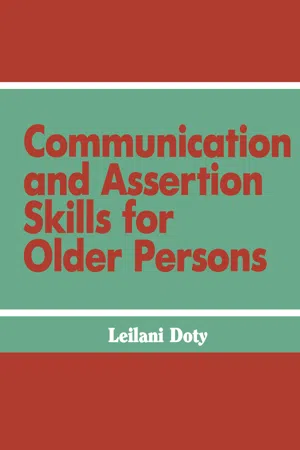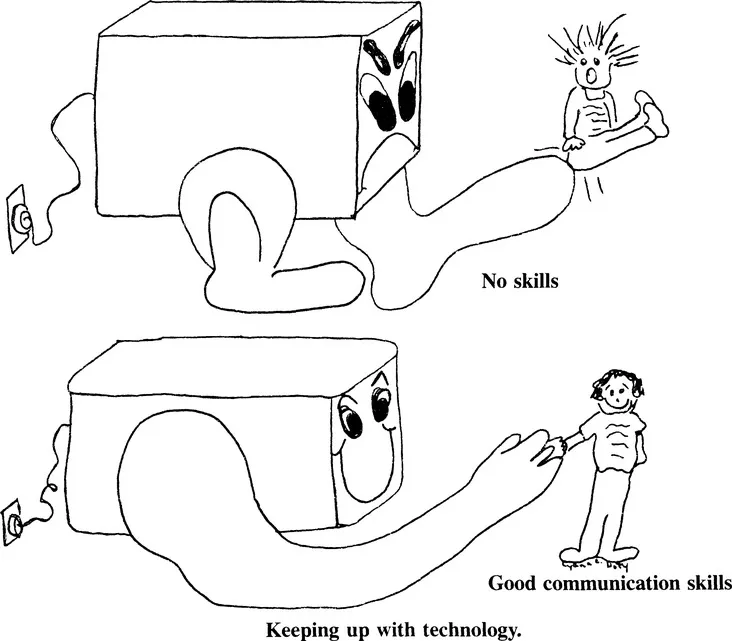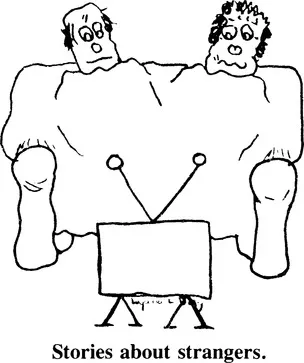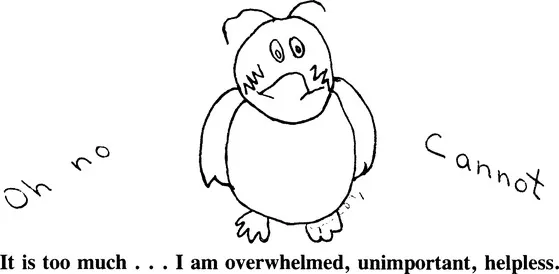
- 110 pages
- English
- ePUB (mobile friendly)
- Available on iOS & Android
eBook - ePub
Communication and Assertion Skills for Older Persons
About this book
First published in 1987. The chapters in the text focus on helping the reader meet these goals and objectives: Build self-confidence; improve social interaction; Listen to oneself and others; Give and receive positive feedback; Express personal feelings, opinions, and experiences; Respect one's own (personal) rights; Respect the rights of others; Increase the practice of selective assertiveness. Topics covered are transition in life, personal awareness, relationships of family members and friends, specific communication skills, selective assertiveness, and reflection on the learning experience.
Tools to learn more effectively

Saving Books

Keyword Search

Annotating Text

Listen to it instead
Information
II
Advanced Skills
7
The Need for Communication Today
Each generation of people has different historical and social settings that contribute to individual development. The settings contribute to the sense of who the people are, how they link with others, and who they will become. The Pilgrims who traveled to the New Land in the 1600s had a different setting from the astronauts who traveled through space in the late 1900s. Although there were few Pilgrims, well-established, close relationships and effective communication helped them to survive.
The survival of the astronauts also depends upon a well-established, support system. The relationships, however, involve contacts with a large number of people located around the world. Many of the people in the support system have close relationships with the astronauts, but there are many others, such as television viewers, builders of rocket parts, trained observers, or newspaper journalists, whom the astronauts will never meet.
As a result of such different kinds of relationships, effective communication is very important to the survival of the astronauts. The strength of their support system depends on their ability to communicate. Clear, effective communication with different kinds of people separated by thousands of miles is essential to keep their lifelines working.
The United States has evolved from an agricultural society to a microtechnological society in the last three centuries. As a result of the changes in the lifestyles of its citizens, effective communication has become essential for older people to survive within the complex support system of the United States.
As they age, the personal definition of the identity of people becomes richer and more complex. With time, the lives of people become increasingly varied. As the years pass, they develop deeper, different relationships as they live first with family members, then become involved with neighborhood friends, and later with associates at school and work.
They expand their interests and activities. Activities that were available in the local, small neighborhood may change when the child goes to school. They may change again later when the person is a young adult, graduates from a training program, finds a job in a new community, and then sets up a home.
The setting in which a person lives may extend to one county or the whole country. Some people have a business at home; others travel great distances to work. The grocer whose family business has been located in the same store for 100 years has a strong sense of identity with the small town. The sense of identity may be just as strong, but different from that of the senator who commutes cross-country every week to Washington, D. C. to represent the home state. The boundaries of the senator’s work setting may extend to horizons that are thousands of miles apart.
To a certain degree, the high level of technology in society today is responsible for the expansion of experiences in people. People may enjoy adventures in remote countries without moving from the comfort of their homes. Today, technology provides television, radio, newspapers, and magazines that quickly deliver information about celebrations and conflicts occurring at distant places. International distances seem to have shrunk with the advances of technology. Today, people in all countries can become aware and feel intimately involved with the daily activities of other countries throughout the world.

Although aware of daily life on the international level, an individual may feel no sense of participation in the development, planning, and unfolding of these events. A complex set of political policies, economic changes, military mandates, territorial conflicts, research explorations, and ecological concerns from throughout the world spread out before the individual each day.
In the morning newspaper at breakfast, from the radio at work, or on the evening television news after dinner, a person may feel burdened with the details of life in countries that are far away. Advanced camera technology portrays striking pictures of events. The stories of strangers are vivid and real.

Exposed to pain and confusion in the lives of many different individuals, a person may feel concerned. But, at the same time, the person may feel emotionally removed from the aching of the strangers in the situations. A sense of hopelessness may begin to creep in. The individual may realize that the ability to receive the information that stirs up feelings is accompanied by an inability to influence the turmoil and unhappiness that is occurring in such distant places.
This becomes especially frustrating to people who witness the ravages of war, earthquakes, blight, hunger, and disease. Though witnessed closely through television, world events seem beyond the influence of any single person. Doubt is stirred. Questions arise from within. How can one person be of any help? How may one individual make a difference in what happens throughout the world? Should one try to become involved? As the frustration mounts from such questions, a sense of helplessness begins.
As the sense of helplessness increases, a feeling of futility grows. As the years pass, the futility that started with frustrations about crises in foreign lands begins to overlap with issues that are closer to home. The futility begins to involve community issues, neighborhood issues, and, finally, immediate relationships. People begin to wonder how one person may influence anyone else’s life?
For some, the sense of helplessness may spread further. It may spread to their personal lives. They may begin to feel powerless to plan or control the direction of their own lives. Not only do they feel helpless about issues in Asia, the local state, and the neighboring city hall, but also they feel that nothing can be done to improve their own situations in life. Life seems to be a matter of good or bad luck.

How may an individual develop a sense of significance when feeling so helpless? How may such a person accomplish anything? Does one life have any meaning or worth in the midst of all the events that surround these powerless individuals?
These questions become critical, personal issues for the aged. Often they begin to feel worn out by a lifetime of questions and continuing circumstances that seem beyond their control.
BEING OLD
People think of their identity or who they are in terms of what happens to them and around them. The events in their personal lives, relationships, and communities help them to understand themselves. These events help them draw up a personal definition of their lives. All the information collects into a more detailed description of their identity.
With the passing of time, they have aged. Now they are caught up in the negative feelings that society has about being elderly. Having grown up with the norms, the typical standards and beliefs of their culture, they believe as society believes. They endorse agism, the negative ideas and statements about getting old. They see and think of themselves as diseased, deteriorating, disabled, disengaged, dependent, and distant from others. Is it any wonder that many of the aged feel frightened and hopeless?
The 3 to 5 percent of the total elderly population, who are actually frail, disabled, and helpless, struggle to survive. They need skilled nursing care around the clock. They are inclined to withdraw from the challenging, invigorating events of life to hold onto bare survival. They conserve the small amount of their remaining strength to exist at a minimal level of survival. Few alternatives seem to exist for them if they want to stay alive.
About 7 percent of older people need some assistance with the routine of normal, daily life. They are able to live in the community with a team of helpers, such as a housekeeper, a home health aide, and a close relative. Approximately 85 percent of older people are independent, however, and require no assistance in their normal, daily routine.
IMPORTANCE OF COMMUNICATION AND ASSERTION SKILLS
To develop a sense of strength and significance in life, people must begin with the self. As people begin personal development, they reach a level of awareness, involvement with activities, and wellness that motivates them to reach out to others.
Developing solid relationships strengthens all parties involved. Strengthened by their relationships, people may extend their involvement into the concerns of the community and then the larger society. As a participating member of a group, the individual has a more powerful voice. United with others, he may advocate for change. United with others, she may help develop legislation that provides new direction for the country. Evidence of such united efforts may be seen in the work of silver-haired legislatures throughout the country.
As the sense of making a difference grows, a person feels more in charge of personal behavior. The person gains a sense of self-direction. Then the person feels like a significant contributor to the behavioral change in the immediate and extended network of friends.
The nexus of influence has started. One feels in charge of life. As a result of this, the person feels intimately involved in the process of living. This involvement stimulates, energizes, and transforms older persons. It brings to them a sense of happiness and satisfaction with life.
INTERPERSONAL SKILLS
Communication skills play an intimate role in helping a person make contact with other people. An individual develops relationships by being able to communicate effectively with others. Being able to talk clearly provides accurate information and the genuine sharing of oneself with others.
People make contact with one another by sharing their ideas, feelings, and concerns with each other. They influence each other’s lives. They care for one another.
Being important in the lives of others makes them feel significant. Interpersonal skills are the tools that help them to make the experience of life rich with involvements, commitments, and challenges. They strengthen their sense of individual worth. Also, they strengthen their sense of “we-ness,” being a part of the lives of other people.
Selective assertion, often called selective assertiveness in this text, is an important tool to use in establishing and developing relationships. Selective assertiveness is a process that helps a person make choices that are meaningful and fulfilling. The choices are respectful to the person who has made them. In addition, the choices respect the rights of the older people involved in the situation.
By choosing to say or do what one thinks is most sensible and appropriate, a person may move in a desirable direction or achieve a desired goal. This actio...
Table of contents
- Cover
- Half Title
- Title Page
- Copyright Page
- Dedication Page
- Contents
- Preface
- I Basic Skills
- II Advanced Skills
- Bibliography
- Index
Frequently asked questions
Yes, you can cancel anytime from the Subscription tab in your account settings on the Perlego website. Your subscription will stay active until the end of your current billing period. Learn how to cancel your subscription
No, books cannot be downloaded as external files, such as PDFs, for use outside of Perlego. However, you can download books within the Perlego app for offline reading on mobile or tablet. Learn how to download books offline
Perlego offers two plans: Essential and Complete
- Essential is ideal for learners and professionals who enjoy exploring a wide range of subjects. Access the Essential Library with 800,000+ trusted titles and best-sellers across business, personal growth, and the humanities. Includes unlimited reading time and Standard Read Aloud voice.
- Complete: Perfect for advanced learners and researchers needing full, unrestricted access. Unlock 1.4M+ books across hundreds of subjects, including academic and specialized titles. The Complete Plan also includes advanced features like Premium Read Aloud and Research Assistant.
We are an online textbook subscription service, where you can get access to an entire online library for less than the price of a single book per month. With over 1 million books across 990+ topics, we’ve got you covered! Learn about our mission
Look out for the read-aloud symbol on your next book to see if you can listen to it. The read-aloud tool reads text aloud for you, highlighting the text as it is being read. You can pause it, speed it up and slow it down. Learn more about Read Aloud
Yes! You can use the Perlego app on both iOS and Android devices to read anytime, anywhere — even offline. Perfect for commutes or when you’re on the go.
Please note we cannot support devices running on iOS 13 and Android 7 or earlier. Learn more about using the app
Please note we cannot support devices running on iOS 13 and Android 7 or earlier. Learn more about using the app
Yes, you can access Communication and Assertion Skills for Older Persons by Leilani Doty in PDF and/or ePUB format, as well as other popular books in Psychology & Mental Health in Psychology. We have over one million books available in our catalogue for you to explore.